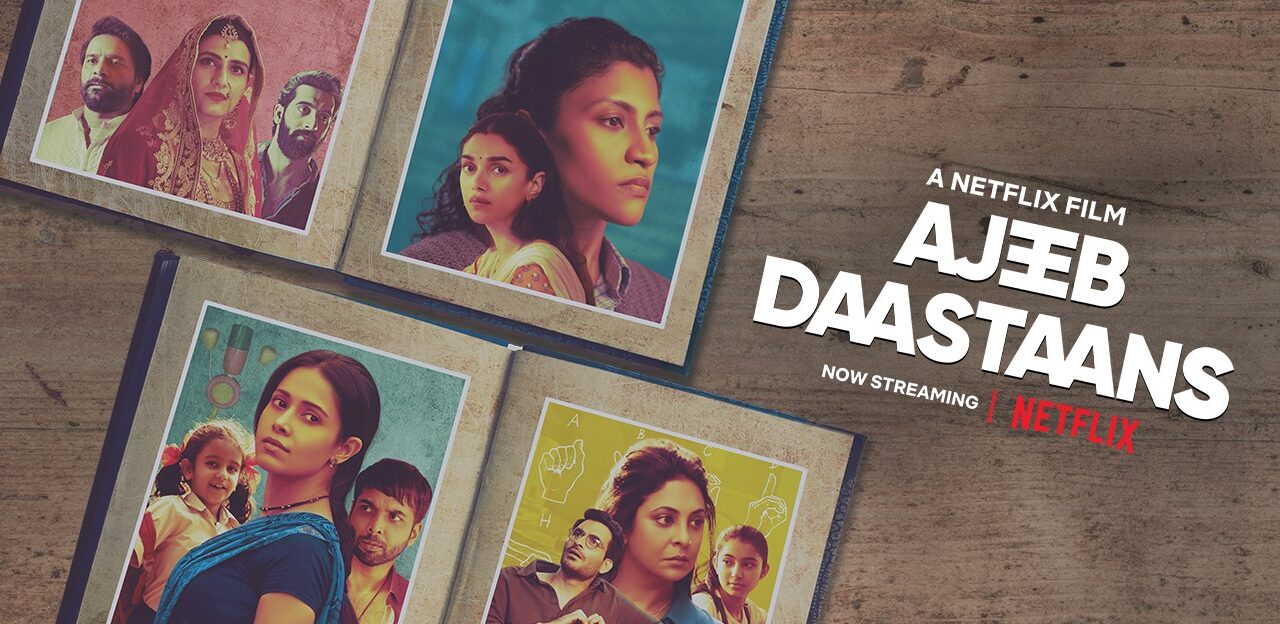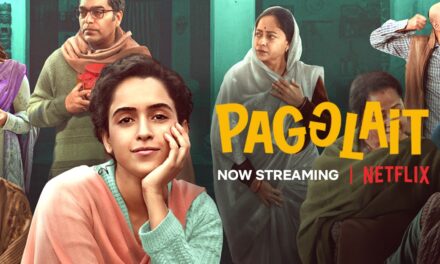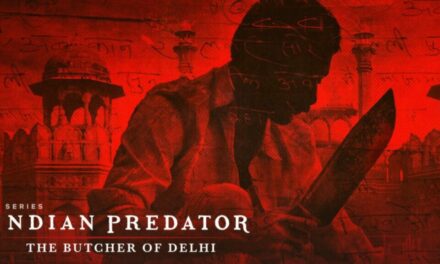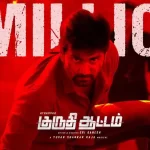Directors: Shashank Khaitan, Raj Mehta, Neeraj Ghaywan, Kayoze Irani
Cast: Fatima Sana Shaikh, Jaideep Ahlawat, Abhay Joshi, Armaan Ralhan, Nushrratt Bharuccha, Abhishek Banerjee, Inayat Verma, Maneesh Verma, Konkona Sen Sharma, Aditi Rao Hydari, Gyan Prakash, Bachan Pachehra, Sreedhar Dubey ,Shefali Shah, Manav Kaul, Tota Roy Chowdhury, Sara Arjun
Language: Hindi
One thing I love about this season of anthologies is that we get to watch a great range of stories via the film medium. Since each movie is short, we get a quick reprieve (if needed) and in some cases, some intense stories spanning few minutes. Ajeeb Dastaans is a mix of inane and intense stories.
The very first film, Majnu by Shashank Khaitan, is the story of a gay drug lord Babloo (Jaideep Ahlawat) who is forced marry a politician’s daughter Lipakshi (Fatima Sana Shaikh). As Babloo stays away from his wife from the very first day of the marriage, Lipakshi takes her revenge by flirting with every available man. The sudden appearance of Raj (Armaan Ralhan) affects the couple, in their own way. Even as we feel for Babloo and Lipakshi, there is not enough gumption in the plot for us to totally embrace this feeling. The plot seems half-baked, and the cast do not give us much to take home to.
Next up is Khilauna by Raj Mehta, easily the most ‘problematic’ film of the lot, at least for me. The film attempts to showcase the class differences in society through the lens of Meenal (Nushrratt Bharuccha) and her younger sister Binny (Inayat Verma). Meenal works as the domestic help in upscale household and is angry at the upper class. As she tries to sustain herself and her younger sister, a terrible incident leaves them unhinged. What works in Khilauna is Nushratt’s okay-ish acting. What doesn’t work is the amateurish plot that tries to say something but ends up with something completely different. There are too many unrelated scenes in Khilauna that make it a dull watch. (P.S. Brownie points to anyone who can figure out the role of the pressure cooker in the last scene!)
The best of the lot and a film that portrays something intense and much more, is Geeli Pucchi by Neeraj Ghaywan. Neeraj (director of the critically-acclaimed Masaan) gives us a heart-wrenching tale of caste, love, friendship and class with a superb cast and nuanced writing. Second names play a key role in Geeli Pucchi. When Priya Sharma (Aditi Rao Hydari) asks Bharti Mandal (Konkana Sen Sharma) her second name, Bharti hesitates and ends up saying Banerjee instead of Mandal. Bharti is Dalit and queer while Priya is newly-married and upper-caste. When the two strike a friendship, they discover love, caste-class conflict, and the grey areas in between. Konkana Sen Sharma shines and makes us marvel at her acting chops. She excels in her role as a queer Dalit who does not think twice about punching a man in his face. Aditi Rao Hydari surprised me as the innocent upper caste woman who is yet to fully comprehend her life, her feelings, and her privilege. Geeli Pucchi is what we need right now. It is sensitive, nuanced, and hard-hitting and makes us look at privilege in a completely different angle.
The second-best film of the lot is Ankahi by Kayoze Irani. Natasha (Shefali Shah) is a middle-aged married woman with a daughter who is slowly becoming differently abled. When her relationship with her husband becomes strained, Natasha finds solace in a young differently abled photographer Kabir (Manav Kaul). In Ankahi, we get to see the blossoming of a relationship. The two actors share a wonderful chemistry, and you end up rooting for them, despite the circumstances. The climax of Ankahi is particularly moving. Watch this film just for its lovely writing and a perfect cast.










